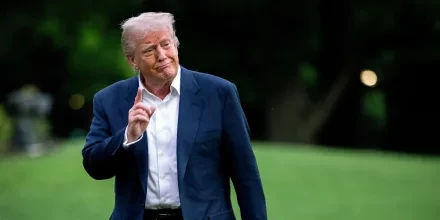
Donald Trump’s tariff war are an attack on one of the foundational pillars of the global neoliberal order. Free trade, supported by principles such as reciprocity, national treatment and commitment to decision-making based on unanimity have been cardinal in the establishment of the existing global trading system since 1947.
Indeed, the establishment of the World Trade Organisation (WTO) in 1995 was a recognition of the need to establish an all encompassing and rules-based trading system.
Although a lot of other contentious issues still remain under discussion, the system has operated moderately well, until recently.
Trump’s unilateral decision to impose high tariffs on the US’s trading partners presents a huge challenge to the sustenance and stability of the global neoliberal economic order.
He believes the US has been taken advantage of by China and the majority of countries. The highest tariffs have been imposed on China. China has responded with tariffs of 125%, and has halted importing beef from the US, opting for Australia.
Even smaller economies such as Lesotho were slapped with tariffs (largely owing to the dominance of Chinese investors in AGOA exporting factories).
Trump also hit Zimbabwe with 18% in tariffs with the latter responding by removing all tariffs on US imports. In the midst of these uncertainties, countries which have to date been eligible for AGOA are also not sure if it is going to be renewed when it expires in September.
This happened not so long after Trump had ordered a moratorium on United States Agency for International Development (USAid) disbursements pending an investigation into the use of funds and impact-related matters.
- Zim hit by grain shortage
- Zim must step up to increase exports: UK
- Ncube rules out income tax relief
- Global trade: Unfolding curse of low expectations
Keep Reading
This has come with painful effects to developing and least developed countries who have been dependent on USAid funding for their health sectors and other humanitarian needs, especially in Africa. Significant numbers of people who work in the civil society and non-governmental sectors in Africa have also lost jobs as a result of this decision.
This also comes at a time when the US has stopped funding the World Health Organisation, an institution that has helped in dealing with health pandemics for decades.
While the need for poorer nations must be independent of aid, there is a need to understand the peculiar situation of these countries. Operating in a global economic environment that does not favour their agro-based and extractive industries, and where the majority of them are highly in debt, it is a fact that aid is still needed.
Such aid has been pivotal in dealing with HIV/Aids related challenges, Malaria, Ebola and other diseases ravaging the African continent. Even before the outbreak of Covid-19, statistics show that more than 30 African countries spent more on servicing debt than on health care. In 2023, African countries paid US$85 billion in debt repayment to external creditors.
This situation is what prompted some thinkers to coin the term “debt colonialism”.
Besides being chained in debt, these countries face infrastructure-related challenges such poor road networks, outdated water reticulation systems and energy deficits.
Surely, an abrupt end to aid funding amounts to shock therapy for these countries whose ability to provide life-saving medicine is severely circumscribed. In Zimbabwe, hospitals lack basic equipment and sundries. This means the country’s ability to cover the gap left by this withdrawal of funding is limited, a situation that also pertains to the majority of Sub Saharan Africa.
Anyone who has read Dambisa Moyo’s seminal work “Dead Aid” would realise that she advocated the need for African countries to stop relying on aid and to do more trade. The quandary that these countries find themselves in today is that some of the aid has been stopped while the foundations of the world trading system have been attacked. Thus, while trying to extricate themselves from the tentacles of aid dependency, they face a trading system that is becoming unfriendly by the day.
Instead of continuing on a trajectory of multilateralism, unilateralism and economic nationalism appears to be taking root again, thanks to Trump.
Thus, these countries appear trapped between a rock and a hard place. For some, China may be an alternative source of aid, but questions remain regarding China’s ability and willingness to step in to fill this gap.
As one professor at the University of Nairobi put it, “it is time for China to stop pretending. It must rise to the occasion and become the global power that it has always wanted to be”.
While this may not describe the foreign and strategic position of China, African countries need to strengthen their trade ties with this Asian economic behemoth.
This is because China has shown that it is committed to multilateralism and also as the world’s biggest manufacturer of a large variety of products, it has more to gain from a rule-based trading system.
The huge market in China for various products from Africa should be enough incentive for any serious African country to exploit. Unfortunately, a learning visit I undertook to China in 2024 revealed that a lot of Sub-Saharan African countries are not able to exploit the duty-free quotas made available for them in the Chinese market because of lack of production capacity as well as stringent sanitary and phyto-sanitary measures put in place by the Chinese government. The issue of capacity to produce tradable goods also affects intra-African trade being promoted through the African Continental Free Trade Area.
Thus, African countries still have their work cut out for them even when trading amongst themselves or with a predictable partner such as China.
Dr Chipaike is a researcher. These weekly articles are coordinated by Lovemore Kadenge, an independent consultant, managing consultant of Zawale Consultants (Pvt) Ltd, past president of the Zimbabwe Economics Society and past president of the Chartered Governance & Accountancy Institute (CGI) in Zimbabwe. — [email protected] or mobile: +263 772 382 852.











